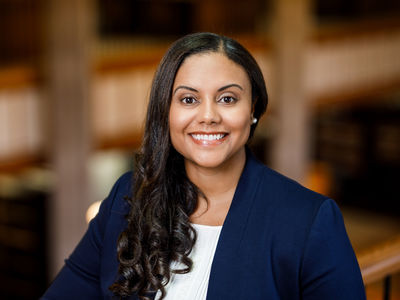Program on Ethics, Compliance & Inclusion announces initiatives for 2020-2021 academic year

“To be a Negro in this country and to be relatively conscious is to be in a rage almost all the time.” ― James Baldwin
I am not sure I have ever understood this quote as completely as I have over the past few weeks. You might not know it from looking at me. Walking around the block with my kids. Weeding in the front yard. Waving dutifully at my (white) neighbors. Far too often, rage is a masked part of life, tempered by a desire to not be labeled as an angry Black person. But I am in a rage. A rage unlike any other I have experienced.
In my rage, however, I often feel helpless. What can I do to address the racial disparities connected to the global Covid-19 pandemic? How do I begin to address the disparities in our justice system? What can I do to stop the senseless killing of Black men and women all across this country by law enforcement and vigilantes? What can I do to ensure that my children—my beautiful Black children—will live in a more perfect union? One that judges them on the content of their character and not on the color of their skin. At the end of the day, I am a law professor with expertise in areas unrelated to public health or qualified immunity. At times, I feel as if I have nothing meaningful to contribute to the most pressing issues of our time. Yet, it is clear I must do something. That we all must do something.
Dean Marcus Cole issued his own statement, which called on each of us to commit to doing three things to make this world a better place. The Notre Dame Black Law Students Association has also outlined initiatives for the Law School community to consider to combat systemic racism and promote greater equality within our community. As the Director of the Program on Ethics, Compliance & Inclusion, I have thought deeply about what I can contribute to ensuring the Law School community seizes this moment to grow and change for the better. I have no illusions that I can change the world in an instant, but I can work to make this place a more inclusive environment that confronts and addresses the issues of our day, equipping our students to do the same as they become lawyers and go out into the world.
During the 2020-2021 academic year, the Program on Ethics, Compliance & Inclusion will partner with various NDLS student groups on three initiatives. Our hope is to foster and promote conversations within our own community related to white privilege, implicit bias, systemic discrimination, and building inclusive environments.
First, the Program on Ethics, Compliance & Inclusion, the American Constitution Society, and the Federalist Society will partner throughout the year to host a book series. The goal of the series is to foster a year-long conversation within our community about racism in America. During the Fall semester, we will read two books: What the Negro Wants and White Fragility. The Program on Ethics, Compliance & Inclusion will provide 100 copies of each book to interested students free of charge.
Second, the Program on Ethics, Compliance & Inclusion will partner with the Black Law Students Association and host a keynote address on Thursday, October 8, 2020. The Honorable Carl E. Stewart of the United States Court of Appeals for the Fifth Circuit will provide remarks on how he has achieved success despite the difficulties presented by racial disparities within the legal profession. Judge Stewart recently completed a term as the Chief Judge of the Fifth Circuit Court of Appeals—the first Black chief judge in the circuit’s history.
Third, the Program on Ethics, Compliance & Inclusion will partner with the Law Review to host an online symposium in the Spring addressing diversity and inclusion at Notre Dame Law School. Current NDLS students will be able to submit papers to the Law Review, with one paper selected for publication as part of the online symposium.
The challenges confronting our nation and world are significant. They can feel overwhelming. But we all must do something to ensure the world tomorrow is better than the world today. While it might not always feel as if we are equipped to save the world, we can certainly work together to make our own community stronger, better, and more inclusive. I welcome the opportunity to take action and to obtain tangible results in our work for justice and equality.
In conclusion, despite the challenges of the day, I have a great deal of hope. My hope comes from knowing the power of our community, the strength of our students, and the depth of our commitment to creating a more just world. This is our moment. This is our opportunity to put into practice our aspiration to be “a force for good in the world.”